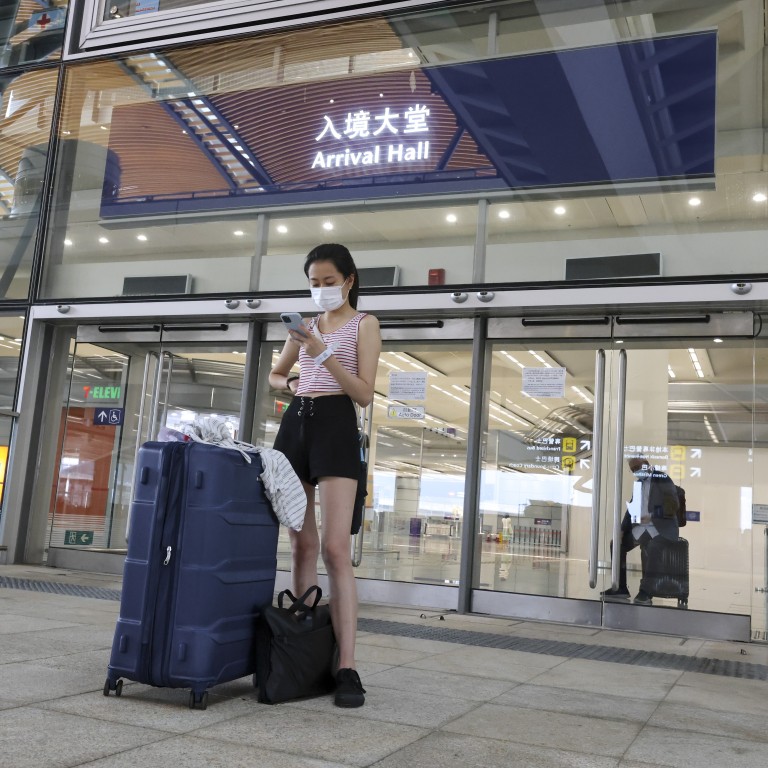
Coronavirus: Hong Kong leader Carrie Lam reveals scheme aimed at mainland Chinese travellers has been put on hold
- In light of a fresh outbreak in Guangdong, the government has postponed the launch of its ‘Come2HK’ scheme
- The plan, which would have allowed mainland travellers to come to the city without quarantining, was meant to have kicked off last month
Hong Kong’s leader has announced the postponement of a scheme that would have allowed for quarantine-free entry for arrivals from mainland China, as officials across the border battle a fresh outbreak of coronavirus cases in neighbouring Guangdong.
U-turn for Hongkongers returning from mainland China ‘not forced by outsiders’
Last November, Hong Kong authorities launched the “Return2HK” scheme to allow the city’s residents living on the mainland to return to Hong Kong without undergoing 14 days of quarantine.
In May, Lam revealed that another scheme, dubbed “Come2HK”, would be launched later in the month to enable non-Hong Kong residents – including mainlanders and expatriates living across the border – to come to the city without undergoing compulsory quarantine.
On Wednesday, however, she acknowledged that the plan would have to be postponed, telling lawmakers that while the central government understood that resuming cross-border travel was vital for Hong Kong’s economy, it preferred to play it safe.
“I fully understand why such caution is needed. Originally we were to launch the Come2HK scheme in May … but due to the recent epidemic situation, we need to put this on hold,” she said.

The revelation came as authorities in neighbouring Guangdong continued to expand rapid coronavirus screening and lockdown measures in response to a fast-spreading variant outbreak traced to an elderly woman who dined with friends at a dim sum restaurant last week.
On Tuesday, Guangdong saw 10 new local infections, seven of them in the provincial capital of Guangzhou, where most cases are concentrated, and three in Foshan.
Two communities in Liwan district in Guangzhou were raised to high-risk status, and seven other areas in the city and Foshan are considered medium risk. The city of Lu’an in Anhui province has also been deemed medium risk.
Multiple areas within the high- and medium-risk zones have been placed under lockdown in a bid to keep the virus from spreading further.
Hong Kong residents living in those areas are not allowed to take advantage of the “Return2HK” scheme when entering the city, and must quarantine for 14 days upon arriving.
Bookings brisk for ‘cruises to nowhere’ as Hongkongers crave a holiday: operator
Terence Wong, a 43-year-old Hongkonger who lives in one of the high-risk zones in Guangzhou, said he had to delay a planned trip back to the city this month.
“I had originally planned to go to Hong Kong to apply for a certificate of absence of marriage, as I am planning to get married later this year and register here,” said Wong, who has lived in Guangzhou for 12 years. “I need to go there personally to handle this, but without the Return2HK scheme, the expense is too large.”
Wong added that he was unbothered by the lockdown, though it had made it tougher to get his hands on food and litter for his cat.
Government pandemic adviser Professor David Hui Shu-cheong said that it was unnecessary to extend the ban on using Return2HK to all of Guangdong, given its massive size, calling the decision to apply the restrictions only to the medium- and high-risk zones appropriate.
“The mainland has already adopted lockdowns in individual districts, and we haven’t seen the disease spread to an entire city,” Hui said.
Asked whether the ban could be extended to the rest of Guangdong, the city’s Constitutional and Mainland Affairs Bureau said it would continue to stick to the mainland’s classification of medium-and high-risk areas.
Hong Kong on 40-day streak of 0 unlinked Covid-19 cases after cop’s false positive
Meanwhile, the government announced late on Wednesday that visitors and returnees arriving from the mainland and Macau would be subject to stricter compulsory testing requirements starting Thursday.
Those who are vaccinated or using the Return2HK scheme, and who enter the city via a land border checkpoint, will be required to take one more coronavirus test, on top of the current two. Those who are not vaccinated or using the scheme will have to take an extra three.
Vaccinated travellers and ones using the scheme who arrive from the mainland and Macau via the airport will have to take two additional tests, while the unvaccinated and those not using Return2HK will have to take an additional four.
Travellers from Taiwan and Singapore also face stricter arrangements. Vaccinated arrivals will now be subject to 14 days’ quarantine, up from seven, while unvaccinated ones will have to undergo 21 days, up from 14.
Arrivals from the two places will also have to take compulsory coronavirus tests on 12th, 16th and 19th days of their stay.
Additional reporting by Elizabeth Cheung and Danny Mok

